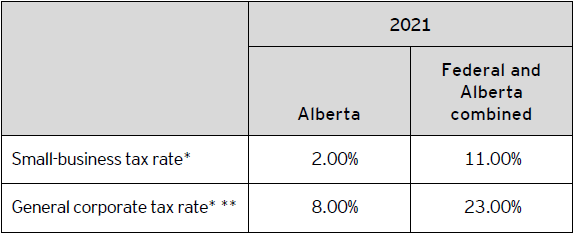
Alberta budget 2021‑22
Tax Alert 2021 No. 04, 25 February 2021
“A robust economy and real wealth creation is built on the effort, investment and ambition of citizens and businesses — and government’s role is to provide a business environment that encourages the entrepreneurial spirit of its people.”
Alberta Finance Minister Travis Toews
2021–22 budget speech
On 25 February 2021, Alberta Finance Minister Travis Toews tabled the province’s fiscal 2021–22 budget. The budget contains no new taxes and no tax increases.
The minister anticipates a deficit of $18.2b for 2021–22 and projects further deficits of $11.0b for 2022–23 and $8.0b for 2023–24.
Following is a brief summary of the key tax measures.
Business tax measures
Corporate tax rates
No changes are proposed to the corporate tax rates or the $500,000 small-business limit.
Alberta’s 2021 corporate tax rates are summarized in Table A.
Table A – 2021 Alberta corporate tax rates

* The rates represent calendar year-end rates unless otherwise indicated.
** Alberta has accelerated the tax cuts that were enacted in 2019, by reducing the province’s general corporate income tax rate from 10.00% to 8.00% effective 1 July 2020. The rate was originally scheduled to be reduced from 10.00% to 9.00% on 1 January 2021 and to 8.00% on 1 January 2022. The general corporate income tax rate was already reduced to 11.00% effective 1 July 2019 and to 10.00% effective 1 January 2020.
Other business tax measures
The minister also highlighted the following new business tax measures:
- Innovation Employment Grant (IEG) – The previously announced IEG1 became effective 1 January 2021 and is available to corporations that undertake Research & Development (R&D) activities in Alberta. The grant is a refundable tax credit.
- The grant provides qualified corporations with:
- An 8% payment for eligible R&D spending carried out in Alberta, up to the corporation’s base level of spending.
- An enhanced 20% payment for eligible R&D spending that exceeds the corporation’s base spending level.
- A corporation’s base level of spending is determined by calculating its average qualifying R&D spending over the previous two years.
- The grant provides benefits on up to $4 million in annual R&D spending.
- For further details on the IEG, see Information Circular IEG-1 – Alberta Innovation Employment Grant.2
- The grant provides qualified corporations with:
Personal tax
Personal income tax rates
The budget does not include any changes to personal income tax rates.
The 2021 Alberta personal tax rates are summarized in Table B.
Table B – 2021 Alberta personal tax rates

For taxable income in excess of $209,952, the 2021 combined federal-Alberta personal income tax rates are outlined in Table C.
Table C – Combined federal and Alberta 2021 personal tax rates

* The rate on capital gains is one-half the ordinary income tax rate.
** The federal basic personal amount comprises two elements: the base amount ($12,421 for 2021) and an additional amount ($1,387 for 2021). The additional amount is reduced for individuals with net income in excess of $151,978 and is fully eliminated for individuals with net income in excess of $216,511. Consequently, the additional amount is clawed back on net income in excess of $151,978 until the additional tax credit of $208 is eliminated; this results in additional federal income tax (e.g., 0.32% on ordinary income) on net income between $151,979 and $216,511.
Personal tax credits
This budget proposes no changes to personal tax credits or amounts.
Other tax measures
Property tax assessment review for oil and gas properties
The government previously implemented several property tax incentives to help protect and encourage investment in the oil and gas sector. Specifically, these incentives include:
- Beginning in 2022, new wells and pipelines will not be subject to property taxation until 2025;
- The well drilling equipment tax has been eliminated beginning in 2021;
- Lower-producing wells will be further depreciated, resulting in lower assessed values, starting in 2021; and
- The previously implemented 35% assessment reduction for shallow gas wells and associated pipelines will continue through the 2023 tax year.
Education property tax
Due to the pandemic, the government has decided to freeze the property tax revenue at 2019 levels to lessen the burden on Albertans and Alberta businesses.
Tourism levy
The previously announced abatement of the tourism levy, which covered the period from 1 March 2020 to 31 December 2020, has been extended to 31 March 2021. Effective 1 April 2021, the tourism levy will apply to all short-term rentals offered through online marketplaces.
Learn more
For more information, please contact your EY or EY Law advisor or one of the following professionals:
Calgary
Greg Sherloski
+1 403 206 5355 | greg.j.sherloski@ca.ey.com
Greg Boone
+1 403 206 5306 | greg.boone@ca.ey.com
Dean Radomsky
+1 403 206 5180 | dean.w.radomsky@ca.ey.com
Sanjaya Ranasinghe
+1 780 441 4692 | sanjaya.ranasinghe@ca.ey.com
Edmonton
Dustin Burbank
+1 780 441 4673 | dustin.burbank@ca.ey.com
Hayat Kirameddine
+1 780 412-2383 | hayat.kirameddine@ca.ey.com
Budget information: For up-to-date information on the federal, provincial and territorial budgets, visit ey.com/ca/Budget.

